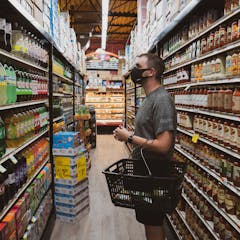
Articles on Food labelling
Displaying 1 - 20 of 71 articles

The free ecoSwitch app takes the guesswork out of sustainable food choices, empowering consumers to take matters into their own hands.

Vegan foods are considered by most consumers to have no ingredients of animal origin, but they may actually contain milk proteins.

Countries that have adopted clear food labels have seen the health benefits. Researchers explain how a new system to alert South African consumers to unhealthy choices was developed.

The increased availability and consumption of unhealthy food has contributed to poor health outcomes.

Australia’s food labelling system is under-performing. Here’s how we can make it more effective.

Unlike some other countries, junk food remains inexpensive and easily accessible in Australia and is widely marketed to kids.

UK supermarket chains have dropped the use of “best before” date labels to reduce the amount of food being thrown out when it’s still perfectly edible. It’s just as big a problem in Australia.

Looking to save money on your grocery bill but not sure about home-brand food? It’s actually a healthy option, with a few exceptions.

South Africa should introduce regulations that mandate the nutritional labelling of fast foods. This will help consumers make informed dietary choices.

There’s a new label on many US food products – here’s what it means and who pushed to add it.

It’s not clear how health claims could be substantiated, enforced or understood, but there are other ways to encourage healthy food choices.

Up to 35% of people misdiagnose themselves (or their children) with a food intolerance or allergy. It’s time to set the record straight.

The cost of food that gets trashed anywhere between the farm and your plate is hundreds of billions of dollars a year in just the US. But a lot can be salvaged as ingredients for other food products.

The COVID-19 crisis highlights the importance of supply chains. But even with the increased recent attention, most supply chains remain murky. Consumers can play a key role in lifting that cloud.

Trust in our global food supply chains remains a concern. For the foreseeable future, much of Canada’s food fraud remains hidden in plain sight, sitting right there on our grocery store shelves.

There are still some serious issues around food labelling that must be addressed and enforcement is one of them.

When a manufacturer lists a serving size on their food label, it’s based on their expectations of what you’ll eat, not what the dietary guidelines recommend.

Margarine makers once had to colour their product pink. Calls to restrict the use of the word milk are similarly protectionist.

South Australia has lifted its moratorium on GM crops, while Tasmania has extended its ban. But the question should no longer be a simple binary of being “for” or “against” GM technology.

A food heath labelling system Australia and New Zealand introduced five years ago is under review and needs a significant overhaul to make it useful for consumers looking for healthy options.





